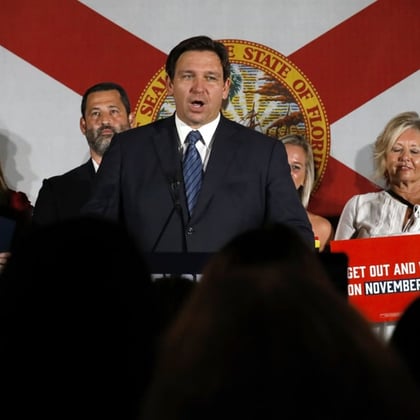What You Need to Know
- The move by Florida's governor to ban state pension funds from ESG screening endangers some Americans' retirement savings, investment professionals say.
- Texas is seeking to isolate financial firms it says are hostile toward the fossil-fuel industry.
- But the finance industry argues that Republican policies put the financial security of U.S. savers in serious jeopardy.
Investment professionals are warning that a Republican campaign seeking to wipe ESG off the financial map puts at risk the savings of ordinary Americans caught in the political crossfire.
Environmental, social and governance investing is now under attack in the world’s largest economy. Florida Governor Ron DeSantis this week banned state pension funds from screening for ESG risks.
Texas is seeking to isolate financial firms it says are hostile toward the fossil-fuel industry. And in Arizona, Republican Senate nominee Blake Masters has characterized ESG scores as an existential threat to America.
The development represents a rapid escalation of aggression toward an investing form that few people even knew existed five years ago.
But the finance industry, which has embraced ever more ESG products promising to address issues like climate change and inequality, is starting to strike back, arguing that Republican policies put the financial security of U.S. savers in serious jeopardy.
“DeSantis’s decision is clearly tied to politics because it’s certainly not in the best interest of pension fund beneficiaries,” according to Bryan McGannon, director of policy and programs at U.S. SIF, a Washington-based group that supports sustainable investment businesses. “Reading between the lines, DeSantis is ultimately saying that climate change is a non-pecuniary issue putting the long-term savings of Florida pensioners at risk. That just doesn’t make sense.”
Growth of ESG
ESG is still a relatively new investing form, and the acronym itself has only existed for less than two decades. But over the past five years, it has outperformed.
U.S. large-cap sustainable equity funds focused on growth rose at an average annual rate of 14% in the period, compared with 11% for conventional non-ESG funds, according to data provided by Morningstar Inc. ESG funds also did better when looking at global and European data from the researcher.
A study published in May by the European Securities and Markets Authority that looked at 6,528 so-called UCITS funds found that ESG generally improves returns and cuts client costs over time. ESMA found that funds focusing on the “S” in ESG tended to perform best.
Ignoring ESG may even open the door to legal liability.
“Existing U.S. securities laws require registrants to disclose any risks that are reasonably likely to have a material impact on their business, results of operation, or financial condition,” said Ken Rivlin, head of the international environmental law group at Allen & Overy. “Failure to disclose such material risks—including climate-related risks, if they’re material—could create a basis for liability.”
DeSantis, who’s pegged as a possible contender for the 2024 presidential election, has promised voters to “protect” them from ESG, which he has claimed threatens their economic freedom. On Tuesday, he characterized ESG as a “perversion” of financial investing.
But evidence exists that shows U.S. voters aren’t as hostile toward efforts to fight climate change as DeSantis suggests. A Harris Poll of US savers conducted on behalf of Nuveen last year found that more than two-thirds of people asked want their employer to offer pension plans that incorporate ESG factors.
What’s more, a study by Enersection, a Houston-based data visualization firm, shows that Republican districts are well ahead of their Democratic counterparts in targeting clean-energy projects. And a data analysis conducted by Bloomberg Opinion and Enersection of where renewable-energy technology gets deployed in the US shows the vast majority is in Republican-led congressional districts.
‘Tragic’ Response
Sasja Beslik, a sustainable finance veteran who’s now the chief investment officer at NextGen ESG, described the decision by DeSantis as “tragic.”
It shows that the governor of Florida and others who share his view “don’t understand that long-term management of pension investments naturally includes material ESG issues that can impact returns,” Beslik said.
“It is pension money that runs the most significant financial risk if they don’t take ESG into account,” he said. “ESG — when done for real — is first and foremost a risk-management tool. Politicians run for four years, maybe eight. But pension money is very long term.”








 August 25, 2022 at 11:34 AM
August 25, 2022 at 11:34 AM












 Copyright © 2024 ALM Global, LLC. All Rights Reserved.
Copyright © 2024 ALM Global, LLC. All Rights Reserved.